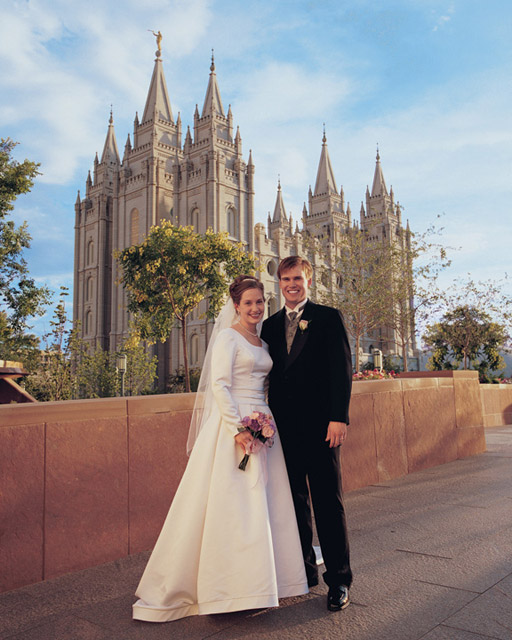Is Polygamy Required in Heaven?
During the past few decades a great deal of media attention has been generated by violent polygamists like Ervil LeBaron and through the antics of leaders like Warren Jeffs. More recently, television shows like “Sister Wives” or the series “Big Love” have thrust modern polygamists into the spotlight. There are perhaps eighty thousand polygamists in the United States today [2014] with approximately half claiming to practice plural marriage as described by Joseph Smith, many calling themselves “Mormon fundamentalists.” [Note that Mormons, members of The Church of Jesus Christ of Latter-day Saints, do not practice polygamy.]
However, some members of The Church of Jesus Christ of Latter-day Saints also [wrongly] believe that one must have plural wives to be exalted into the highest kingdom of heaven. This is not Mormon doctrine.
Short Answer:
No! Joseph Smith never taught, nor did God ever reveal to him that polygamy was a requirement for exaltation. Many modern polygamists and even some LDS Church members believe that Joseph Smith and/or other Church leaders have taught that exaltation requires polygamy. However, the revelation on celestial and plural marriage (D&C 132) teaches that the law and covenant that must be obeyed to avoid damnation is eternal marriage not plural marriage.
In unambiguous language, verses 19–20 declare that a worthy monogamous couple sealed by proper authority will be exalted and shall be “be gods, because they have all power.” The scriptures demonstrate that plural unions may be commanded, permitted, or not permitted depending upon the circumstances of God’s followers on earth. Importantly, unauthorized polygamy is not celestial marriage and creates adulterous relationships.
When interpreting the significance of the 1890 Manifesto or other revelations such as those given in the 1880s, the only opinion that matters is that of the “one” man who holds the sealing keys. Without his authorization, no valid plural marriages can be performed.
Long Answer:
Some observers conclude that Joseph Smith taught that plural marriage is required for exaltation. They may observe that questions about a “plurality of wives” are what prompted the revelation on celestial and plural marriage, now Doctrine and Covenants Section 132, and then assume that everything within it deals with plural marriage. This observation is important because verses 4–6 state that the Lord is going to reveal a “new and everlasting covenant” and that that covenant and “law” must be obeyed or damnation will follow:
[quote_box_center]For behold, I reveal unto you a new and an everlasting covenant; and if ye abide not that covenant, then are ye damned; for no one can reject this covenant and be permitted to enter into my glory.
For all who will have a blessing at my hands shall abide the law which was appointed for that blessing, and the conditions thereof, as were instituted from before the foundation of the world.
And as pertaining to the new and everlasting covenant, it was instituted for the fulness of my glory; and he that receiveth a fulness thereof must and shall abide the law, or he shall be damned, saith the Lord God.[/quote_box_center]
Some authors assert that these verses universally command the practice of plural marriage and that anything besides polygamy (i.e. monogamy) brings damnation. However, several problems exist with this interpretation. First, in 1833, Joseph Smith asked concerning the specific use of tobacco during Church meetings. In reply, he received a revelation that was comprised of a general health code now called the “Word of Wisdom” (D&C 89) that discusses tobacco use in only one verse. Thus, to assume that a question regarding polygamy could not generate a revelation dealing with the broader topic that mentions plural marriage, but is not limited to it, is not justified.
| Question: | God’s Answer: | Scope of Answer |
| What about Tobacco Use? | Word of Wisdom | A general health code that addresses tobacco use, but is not limited strictly to it |
| What about Polygamy? | The New and Everlasting Covenant of Marriage | God’s law of Eternal Marriage that includes plural marriage but is not limited strictly to it |
Second, verse 7 gives the “conditions of the law” that must be obeyed and plural marriages is not listed:
[quote_box_center]And verily I say unto you, that the conditions of this law are these: All covenants, contracts, bonds, obligations, oaths, vows, performances, connections, associations, or expectations, that are not made and entered into and sealed by the Holy Spirit of promise, of him who is anointed, both as well for time and for all eternity, and that too most holy, by revelation and commandment through the medium of mine anointed, whom I have appointed on the earth to hold this power (and I have appointed unto my servant Joseph to hold this power in the last days, and there is never but one on the earth at a time on whom this power and the keys of this priesthood are conferred), are of no efficacy, virtue, or force in and after the resurrection from the dead; for all contracts that are not made unto this end have an end when men are dead. (D&C 132:7; italics added.)[/quote_box_center]

This verse states unambiguously that the primary importance is that proper authority is used in performing any marriage ceremony and that power is controlled by “one on the earth at a time.” A “plurality of wives” is not a “condition of this law,” the “law” mentioned in verse 6 that must be obeyed or a person will be “damned” is that the ceremony be performed by “him who is anointed.”
Third, later verses in D&C 132 promise exaltation to a monogamous couple who are sealed by proper authority and live worthily:
[quote_box_center]And again, verily I say unto you, if a man marry a wife by my word, which is my law, and by the new and everlasting covenant, and it is sealed unto them by the Holy Spirit of promise, by him who is anointed, unto whom I have appointed this power and the keys of this priesthood; and it shall be said unto them—Ye shall come forth in the first resurrection; and if it be after the first resurrection, in the next resurrection; and shall inherit thrones, kingdoms, principalities, and powers, dominions, all heights and depths—then shall it be written in the Lamb’s Book of Life, that he shall commit no murder whereby to shed innocent blood, and if ye abide in my covenant, and commit no murder whereby to shed innocent blood, it shall be done unto them in all things whatsoever my servant hath put upon them, in time, and through all eternity; and shall be of full force when they are out of the world; and they shall pass by the angels, and the gods, which are set there, to their exaltation and glory in all things, as hath been sealed upon their heads, which glory shall be a fulness and a continuation of the seeds forever and ever.
Then shall they be gods, because they have no end; therefore shall they be from everlasting to everlasting, because they continue; then shall they be above all, because all things are subject unto them. Then shall they be gods, because they have all power, and the angels are subject unto them.[/quote_box_center]
No matter how observers wish to interpret Joseph Smith’s revelation on celestial marriage, it clearly states that exaltation is available to monogamous couples who are sealed by proper authority and live worthily (D&C 132:19–20). In addition, verse 61 states that if a man desire a plural wife and proper sealing authority is available, then he may go forward if properly authorized. However, no penalty is mentioned anywhere in the revelation if a man does not desire a second wife.

Fourth, there is no record of Joseph Smith or any other priesthood leader stating that all exalted men are polygamists. During the Temple Lot depositions taken in 1892, President Woodruff was asked “if Joseph Smith had ever taught you at Nauvoo or anywhere else during his lifetime, that in order for a man to be exalted in the hereafter, he must have more than one wife?” He answered, “I don’t know that I ever heard him make use of that expression or use that form of expression.” Similarly when queried, “Did Joseph Smith teach you that a man must have more than one wife to be exalted?”, Nauvoo polygamist and apostle’s wife, Bathsheba Smith responded: “I never heard of that.” A third witness is Joseph C. Kingsbury who was asked if Joseph Smith taught him “that a man could not be exalted in the hereafter unless he had more wives than one,” Kingsbury replied: “No sir. He did not teach me that. He did not say anything about that.” Kingsbury also recalled: “I heard it preached from the stand that a man could be exalted in eternity with one wife.”
While Joseph Smith’s initial question dealt with polygamy, it is plain that the “covenant” and “law” that must be obeyed in order to avoid “damnation” is eternal marriage, not plural marriage. The threat of damnation in verses 4 and 6 is directed at individuals who have the opportunity to be sealed in eternal marriage but instead choose a civil union or some other form of matrimony. They are “damned” in the sense that they “remain separately and singly, without exaltation, in their saved condition, to all eternity” (D&C 132:17) and are not married in the next life. This threat of eternal consequences is similar to that accompanying other covenants and ordinances. For example, a person cannot reject baptism when the opportunity is presented and thereafter expect a second chance to accept it without penalties (see Alma 34:33–35; D&C 45:2).
Read the rest of this article at JosephSmithsPolygamy.org.
Further reading:



